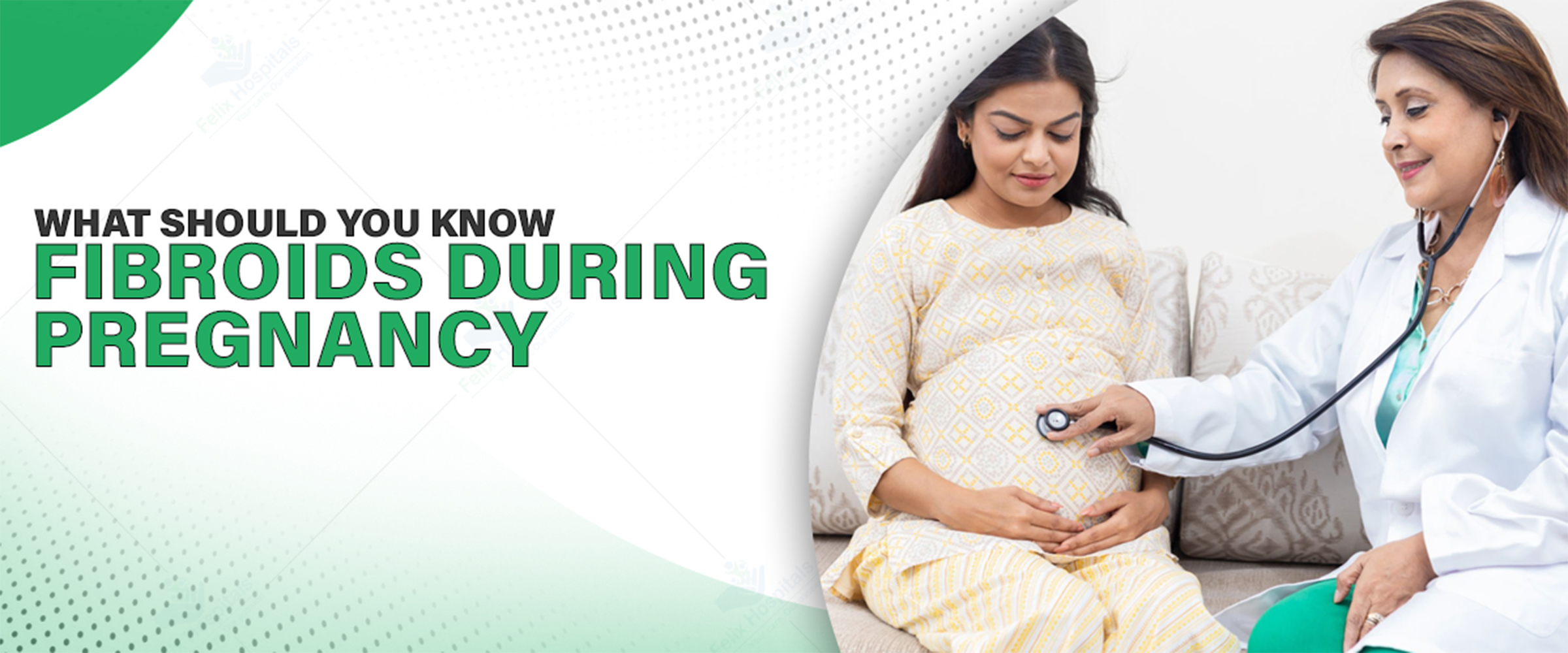
Subscribe to our

Uterine fibroids are abnormal growths in the uterus that can develop during a woman's reproductive years. These growths are benign in nature but can cause severe pain, bleeding, and other side effects. They may grow outside or inside the uterine wall or within the wall of the uterus. Fibroids can occur as single or multiple entities and vary in size. They can have an impact on pregnancy, and while they are known to affect pregnancy, the specific impact varies from woman to woman.
If you have fibroids, you may be concerned about how they could affect your pregnancy. Here is what you might expect to experience during your pregnancy if you have uterine fibroids. For expert advice and personalized care, contact us at +(91) 9667064100.
Problems During the First Trimester
Some small fibroids may develop during a pregnancy. This happens due to a rise in the level of hormones estrogen and progesterone in pregnancy. This could lead to the following problems:
Bleeding and pain
Miscarriage: Women with fibroids, especially those with multiple fibroids or large fibroids, are at a higher risk of miscarriage in the early stage.
Second and Third Trimesters
As the baby grows and the uterus expands, it can push against your fibroids. This can lead to the following issues:
Pain
Preterm delivery
Placental abruption: In this case, the placenta tears away from the wall of the uterus before your baby is born. It is quite severe since the baby will not receive enough oxygen, and you may suffer from excessive bleeding.
During Delivery: A cesarean section may be needed due to uterine fibroids.
The root cause of fibroids is unclear, however, factors may be responsible:
Hormones: The changes in the ovarian hormones estrogen and progesterone can cause fibroids due to the regeneration of the uterine lining.
Family history: If other women in your family have the condition, then you are also at risk of developing it.
Age: Fibroids are most common in women within the age group of 30 and 50.
Obesity: High body weight may also increase your chances.
Fibroids often do not have specific symptoms. In many cases, pregnant women may discover when they go for their first ultrasound to check the baby's growth. However, some expectant mothers with fibroids may have the following symptoms:
Severe cramps, similar to period cramps
Pain and tension in the stomach
Digestion problems, such as constipation
Frequent urination (if the fibroids put pressure on the bladder)
The doctor may first perform a pelvic examination after understanding your symptoms and checking your family history. Post which you may be suggested the following tests. For accurate diagnosis and expert care, consult the Best General Surgeons in Noida for a personalized treatment plan.
Ultrasound: The doctor may suggest a transabdominal (over the abdomen) or a transvaginal (through the vaginal canal) to check for fibroids.
Magnetic Resonance Imaging or MRI may be suggested to detect the location and size of the fibroid.
It is crucial to choose the right surgery to manage fibroids during pregnancy so that there is no negative effect on the baby. The following may be suggested:
Myomectomy: This is a surgical procedure, performed either hysteroscopically (fibroids removed through the vagina and cervix) or abdominally (by a bigger cut in the stomach area) to remove the fibroid.
Cesarean Myomectomy: Done during a C-section, if fibroids are in the way of delivering the baby or if they’re easy to remove safely. Still risky, because of potential bleeding and longer surgery time.
The doctor may also choose to treat the fibroid before conception or wait after delivery, depending on your case.
If fibroids are discovered before conception, they can be treated before pregnancy. The doctor may suggest the following methods to treat fibroids before pregnancy:
Hormone therapy: Gonadotropin-releasing hormone (GNRH) agonists treat fibroids by preventing the production of estrogen and progesterone. This induces a menopause-like condition for a short time. This stops the menstrual cycle and makes the fibroid shrink.
High intensity ultrasound treatment: Focused Ultrasound Surgery is a noninvasive procedure that does not require surgical cuts. In this, you are made to lie down inside the MRI scanner, then the doctor finds the exact location of the fibroid. Once it is determined, a high-energy ultrasound instrument sends sound waves into the fibroid. It heats up the fibroid and destroys it.
Uterine artery embolization: Embolic agents are injected into the arteries that carry blood to the uterus. The particles block the blood flow to fibroids, and they ultimately shrink and die.
It is natural to feel anxious if you are planning to have a baby and have fibroids. The good news is that many women with fibroids have healthy pregnancies and safe deliveries. Early diagnosis, the right medical guidance, and personalized care are key to the good health of both the mother and fetus. It is important to stay informed, have regular checkups, and follow the doctor’s advice. For expert consultation and treatment, trust the Best Hospital for Fibroid Removal Surgery in Noida.
Q1. Can fibroids lead to anemia?
Ans: Fibroids can make your periods extremely heavy or cause bleeding between periods, which can lead to anemia.
Q2. Can fibroids make your stomach big?
Ans: Yes, it is possible if you have large uterine fibroids.
Q3. Can fibroids change over time?
Ans: Fibroids can shrink and grow over time. This might happen quickly or gradually over time.